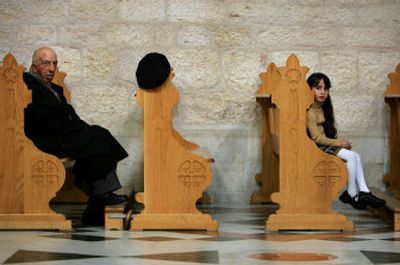Holy Land’s Christian population in decline

BETHLEHEM, West Bank – The death threat came on simple white fliers blowing down the streets at dawn. A group calling itself “Friends of Muhammad” accused a local Palestinian Christian of selling mobile phones carrying offensive sketches of the Muslim prophet.
The message went on to curse all Arab Christians and Pope Benedict XVI, who’s still struggling to calm Muslim outrage over his remarks on Islam.
While neighbors defended the merchant – saying the charges in the flier were bogus – the frightened phone dealer went into hiding, feeling less than satisfied with authorities’ conclusions that the Oct. 19 note was probably a harmless rant.
Now the dealer is thinking of going abroad.
Call it part of a modern exodus, the steady flight of the tiny Palestinian Christian minority that could lead, some predict, to the faith being virtually extinct in its birthplace within several generations – a trend mirrored in many dwindling pockets of Christianity across the Islamic world.
This is one of the major themes the pope is expected to carry to Turkey for a four-day visit beginning Nov. 28 – his first papal visit to a predominantly Muslim nation. The Vatican calls it “reciprocity”: Muslim demands for greater sensitivity from the West must be accompanied by stronger protections and rights for Christian minorities.
In some places, such as Pakistan, it means more safeguards from extremist attacks. In Indonesia and elsewhere, it touches on appeals to quell growing sectarian clashes. In Turkey, Iraq and the rest of the Middle East, it seeks to preserve communities dating back to the time when Jesus and his apostles preached.
But nearly everywhere in Muslim lands, Christian populations are in decline.
No place is this more striking than the Holy Land.
For decades, it was mostly economic pressures pushing Palestinian Christians to emigrate, using family ties in the West or contacts from missionary schools. The Palestinian uprisings – and the separation barrier started by Israel in 2002 – accelerated the departures by turning once-bustling pilgrimage sites such as Bethlehem into relative ghost towns.
The growing strength of radical Islamic movements has added distinct new worries. During protests after the pope’s remarks in September, some of the worst violence was in Palestinian areas with churches firebombed and hit by gunfire.
“Most of the Christians here are either in the process of leaving, planning to leave or thinking of leaving,” said Sami Awad, executive director of the Holy Land Trust, a Bethlehem-based peace group. “Insecurity is deep and getting worse.”
The native Palestinian Christian population has dipped below 2 percent of the West Bank, Gaza Strip and Arab East Jerusalem, down from at least 15 percent in 1950 by some estimates. Meanwhile, the Muslim Palestinian birthrate is among the highest in the world.
Dire predictions abound. The Franciscan Foundation for the Holy Land said Christians could become “extinct” in the region within 60 years.
“It certainly doesn’t look good for us,” said Mike Salman, a Palestinian Christian who has conducted studies on demographic trends.
A walk along Shepherd Street puts a face to the lament.
Hannah Qumsieh spends his days playing online poker, fretting about unpaid bills and trimming his lemon trees at his house overlooking the field where the Bible says an angel told shepherds of the birth of Jesus. Qumsieh retired from the Palestinian tourism office last year but has received no pension checks since the militant faction Hamas won elections in January and the West slashed aid to the Palestinian Authority.
“If I had money to leave, I would,” he said, casting a glance at the newly built white-stone house next door in Beit Sahour, one of the last Christian-dominated enclaves in the West Bank. Bethlehem, just up the hill, is now less than 20 percent Christian.
A day earlier, Qumsieh’s eldest son turned over the house keys to tenants and took his family to Chile. Down the road, a Christian restaurant owner, Ibrahim Shomali, is selling what he can before he leaves with his wife this month. They will head for Flint, Mich., to join his brother and hunt for work in one of the most economically depressed areas of America.
“Here is where Jesus was born and over there, across the hill in Jerusalem, is where he was crucified,” Shomali said. “We Christians now feel like we are on the cross.”